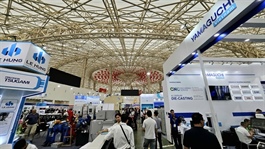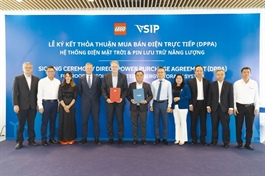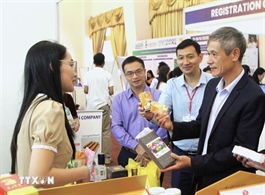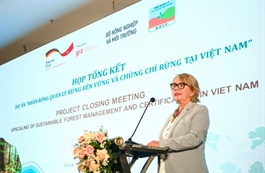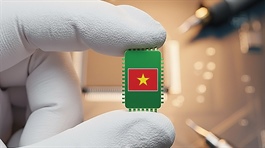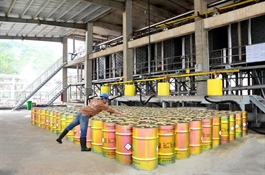UK offers advanced tools for semiconductor solutions
UK offers advanced tools for semiconductor solutions
Vietnam and the United Kingdom are cementing their semiconductor ties. British Ambassador to Vietnam Iain Frew talked with VIR’s Thanh Tung about current cooperation and how such ties can be strengthened further.
The UK is riveting its strategic partnership, including in semiconductors. Which strategy would be most effective for Vietnam to strengthen connections with leading UK businesses, universities and research institutes in this industry?
|
British Ambassador to Vietnam Iain Frew |
Last month at the National Innovation Centre in Hanoi, we had a UK delegation connecting with the Vietnamese government, business, and academia on the semiconductor industry. This workshop was the first of its kind between the UK and Vietnam, and we are here to help promote the connections and find opportunities for the future.
Now the UK has a deep talent pool and a long history of working in the semiconductor industry, both private businesses, academic institutions, and universities and a wider policy environment and ecosystem, which has led to the UK being one of the leading technology countries in the world with over £1 trillion ($1.35 trillion) invested in the tech sector.
At the event, we had UK technology and semiconductor companies, including Arm, we also had the University of Liverpool as part of this and a range of Oxford Instruments and a range of other businesses who are here to build partnerships with Vietnamese partners.
Now Vietnamese companies have huge ambitions in this area, and the best way that they can connect with their UK counterparts is firstly through missions and forums like this one, sharing expertise, sharing understanding of where there are challenges and opportunities in the industry.
In the UK, we have a new national semiconductor centre, so I highly recommend Vietnamese businesses to continue to build those relationships, perhaps visits to the UK, meeting some of the academic institutions, looking at some of the opportunities for training and upskilling in the semiconductor industry and making those connections with commercial partners where there are real opportunities between our two countries.
In what ways can the UK and Vietnam work together in building capacity, talent, and infrastructure needed to join global semiconductor innovation networks?
So the UK and Vietnam have many opportunities here. Vietnam has set out high ambitions to train 50,000 semiconductor engineers.
This is in line with the national semiconductor strategy, and it’s also very much in line with the UK’s capacities and capabilities. UK institutions offer a range of both technical and professional skills and academic courses, which can help to create the next generation of talent.
So British companies like Arm have its Clemson Access Programme, which helps to provide academic institutions and universities with access to some of the tools they need to help train the next generation, as well as certification and training for semiconductor professionals.
There are opportunities on the training side and, more generally, the opportunities for faculty members and for others in the semiconductor research space to build collaboration. I’m seeing great opportunities both between the companies and between universities in building their expertise in the next generation of semiconductor talent.
The UK’s expertise in semiconductors is in a range of areas. We have compound semiconductor specialism in Wales and we have advanced testing and packaging technology. We want to see Vietnam, as it sets out its own ambition to move up the value chain, to build those connections in these specialist areas with the UK.
Beyond semiconductors, which other future-oriented industries hold strong potential for Vietnam and UK collaboration, and how might they complement each other’s trends?
The UK has recently set out our modern industrial strategy, which highlights eight key area, of which semiconductors is one, for our future economic development. But semiconductors are also a basis for wider economic collaboration and come into play in so many different industries and areas of innovation.
For example, when we look at the potential for us to work together on AI, earlier this year, we had the second UK Southeast Asia Tech Week in Ho Chi Minh City, which brought together AI and other tech specialists who build on these other technologies, training semiconductors to develop the innovations of the future.
At the same time, we’re seeing real potential develop in areas like health technology and the use of data and digital tools to bring together new solutions in business, but also in areas like healthcare, like education, and so I’m seeing a wider scope of the potential for us to work together in technology beyond semiconductors.
In addition to that, we’ve seen a critical development in Vietnam in the announcement of the international financial centres. This is going to help finance flow to tech projects, and the UK has been a hub for tech finance. We want to connect that with Vietnam’s new hubs and to make sure that this investment goes to the technologies of the future, including fintech.
What is the potential for collaboration between Vietnam and the UK in the semiconductor industry, and Vietnam’s potential in general?
There’s huge potential for us to work on together here. Vietnam has such a young, talented, and energetic population, a talent base to build that industry in the future. The UK has a more established industry in semiconductors, and together we can work to share and synthesise these talents into new businesses, new ideas, and new collaborations.
We’ve got so much potential, and we’re going to see over the next few years the collaborations and the workshops we have today built into these new ideas and new businesses.
The potential in Vietnam is generated by its geographic location, its young and talented population, and its access to natural resources, to supply chains. There are so many natural benefits of setting up and developing a semiconductor industry, and value-added in semiconductors here in Vietnam.
But this is a competitive space. Globally, many countries want to be operating in semiconductor manufacturing, testing, and packaging, in the capacity building and training that’s needed. Vietnam needs to make sure it’s got the right policy framework to attract and retain investment; and also talent to make sure that the right skills are developed in to make sure that this industry has a long-term future.
So there is a huge potential, but in order to realise that, the right policy frameworks and programmes of a supportive government, and for business and from universities, are needed.
- 14:44 18/09/2025









